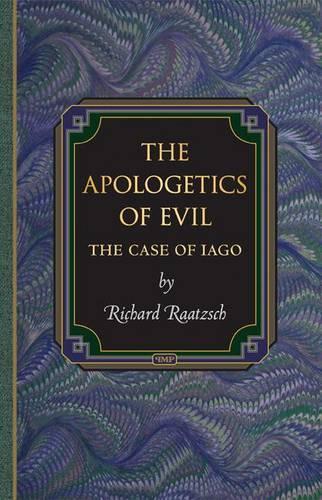
The Apologetics of Evil: The Case of Iago
(Hardback)
Publishing Details
The Apologetics of Evil: The Case of Iago
By (Author) Richard Raatzsch
Translated by Ladislaus Lb
Princeton University Press
Princeton University Press
6th October 2009
United States
Classifications
Tertiary Education
Non Fiction
Literary studies: plays and playwrights
Literary studies: c 1600 to c 1800
170
Physical Properties
Hardback
128
Width 140mm, Height 216mm
28g
Description
This book is a concise philosophical meditation on Iago and the nature of evil, through the exploration of the enduring puzzle found in Shakespeare's Othello. What drives Iago to orchestrate Othello's downfall Instead of treating Iago's lack of motive as the play's greatest weakness, The Apologetics of Evil shows how this absence of motive is the play's greatest strength. Richard Raatzsch determines that Iago does not seek a particular end or revenge for a discrete wrong; instead, Iago is governed by a passion for intriguing in itself. Raatzsch explains that this passion is a pathological version of ordinary human behavior and that Iago lacks the ability to acknowledge others; what matters most to him is the difference between himself and the rest of the world. The book opens with a portrait of Iago, and considers the nature and moral significance of the evil that he represents. Raatzsch addresses the boundaries dividing normality and pathology, conceptualizing evil as a pathological form of the good or ordinary. Seen this way, evil is conceptually dependent on the ordinary, and Iago, as a form of moral monster, is a kind of nonbeing. Therefore, his actions might be understood and defended, even if they cannot be justified. In a brief epilogue, Raatzsch argues that literature's presentation of what is monstrous or virtuous can constitute an understanding of these concepts, not merely illustrate them.
Reviews
"What is evil What are its forms How is it motivated These are questions of the greatest human significance and Raatzsch's treatment of them is sensitive, imaginative, and broadly based. This book brings together different lines of argument from epistemology, moral philosophy, and philosophy of mind in a highly compact and supercharged, yet fully comprehensible form. The result packs an enormous intellectual punch."Raymond Geuss, University of Cambridge
"This original, deeply felt, clearly written, and well-argued book combines Shakespearean analysis, moral philosophy, psychology, and philosophy of literatureall in a succinct, unified, and impressive way."Richard Eldridge, Swarthmore College
Author Bio
Richard Raatzsch holds the chair for practical philosophy at the European Business School in Wiesbaden, Germany.
